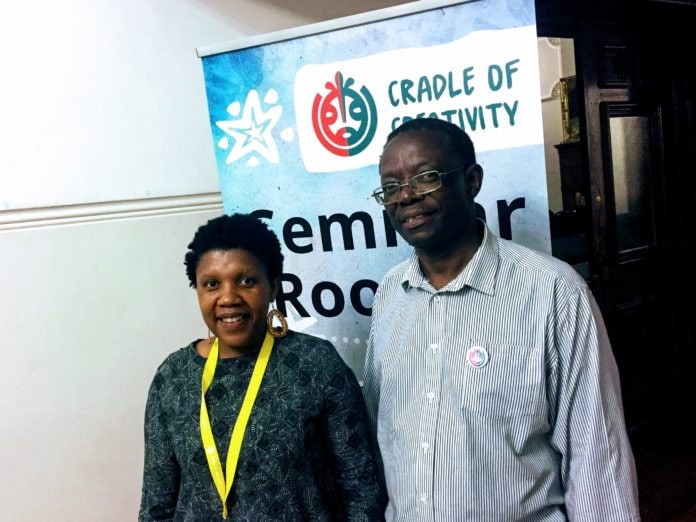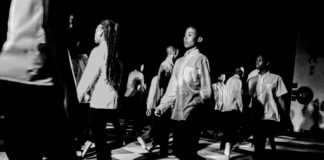The Cradle of Creativity’s Focus Day on Theatre as Education saw an interactive, energetic and embodied Maths lesson take place in the afternoon.
Professor Kennedy Chinyowa (Tshwane University of Technology, South Africa) and Selloane Mokuku (ShakeXperience, South Africa) presented the findings of their pilot study, conducted in collaboration with Dr Tsholofelo Maforah and Professor Willy Mwakapenda, their colleagues at the university. This was a truly interdisciplinary team as Chinyowa, Maforah and Mwakapenda hail from the Departments of Drama and Film Studies, Education, and Mathematics & Statistics respectively, with Mokuku offering her practical expertise as a Drama Practitioner.
Inspired by theorists Paulo Freire, famous for his Pedagogy of the Oppressed, and John Dewey, known for his theories of Learning by Doing, the project piloted “an emerging pedagogy for integrating Arts and Mathematics education” in the Eastern Cape, a province noted for its low academic attainment.
The workshop at the Cradle demonstrated some of the activities that had been used on the pilot project. This included rhythm games in which participants called out numbers between 1 and 10, and counting games in which groups of various sizes explored number patterns.
 The title of the team’s paper, “Crossing the River”, comes from the central exercise that was demonstrated. We were told a story of a river crossing in which a family of 2 adults and 2 children wish to cross the river but find there is only 1 boat between them – and it costs 10ZAR for every trip completed. The boat is only large enough for 1 adult to travel by themselves, though 2 children may fit if they are traveling without an adult. The group was asked: ‘How many trips would it take and how much would be the total cost be for the whole family to cross?’ Instead of working out this problem with pen and paper, they were invited to role play the scenario. Whilst they found it challenging, the group were able to solve this conundrum and, with a little help, they produced a linear equation to describe the relationship between the number of people and the total number of trips required.
The title of the team’s paper, “Crossing the River”, comes from the central exercise that was demonstrated. We were told a story of a river crossing in which a family of 2 adults and 2 children wish to cross the river but find there is only 1 boat between them – and it costs 10ZAR for every trip completed. The boat is only large enough for 1 adult to travel by themselves, though 2 children may fit if they are traveling without an adult. The group was asked: ‘How many trips would it take and how much would be the total cost be for the whole family to cross?’ Instead of working out this problem with pen and paper, they were invited to role play the scenario. Whilst they found it challenging, the group were able to solve this conundrum and, with a little help, they produced a linear equation to describe the relationship between the number of people and the total number of trips required.
This was a powerful learning experience for the pedagogues in the room. Incorporating this role-playing technique had allowed the teaching of Mathematics to be an embodied experience, one in which the students were encouraged to experiment and think outside the box. Many who had been completely nonplussed at the thought of combining Drama and Maths Education, were pleasantly surprised by the results.
What follows are some comments from the students and teachers involved in the pilot project in the Eastern Cape:
“Doing this you will understand how the formula came about or how it was derived […] Mathematics is not abstract or from another planet but this activity showed me that things that we do in our daily lives have Mathematics.”
“This activity made me to see Mathematics in a different way than before, my mind has shifted from thinking that Mathematics is about equations and formulas rather it showed me that Mathematics is interrelated with our daily lives.”
“I think as teachers we also should stop teaching Mathematics as an abstract subject but try to make demonstrations and role plays that learners would understand.”
“I liked the Crossing River activity because it has taught me a lesson that as a Mathematics teacher you need to make the subject to be more interesting by ensuring that you don’t always stick to the textbook whenever you are teaching the kids, but perform some of the activities practically so that the learners can see the nature and the importance of Mathematics.”
To draw these positive responses together, the project team concluded that, “Such interplay between Arts and Maths Education provides an opportunity for engaging learners in such a way that the teaching of Mathematics in isolation may never accomplish”. Overall, this was a fascinating project to learn about, and one that provided a unique addition to the Cradle’s discussions on Theatre as Education.









